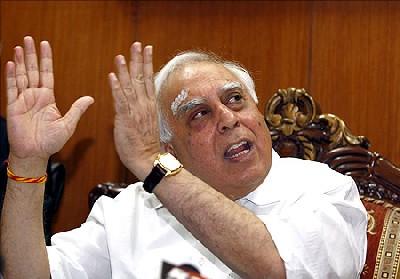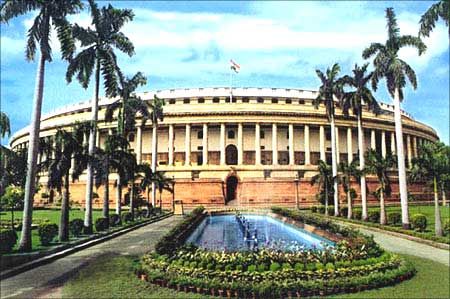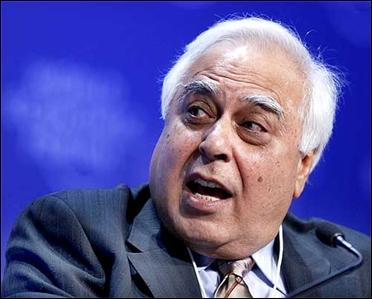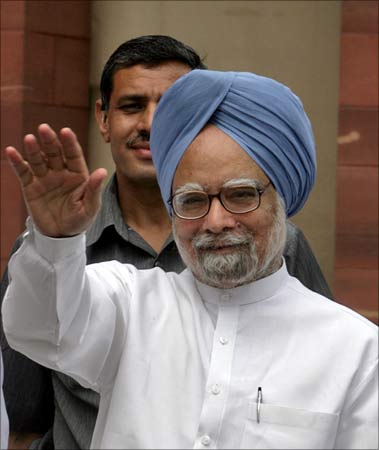 | « Back to article | Print this article |
Govt ties itself in knots on web pre-screening
The surfacing of objectionable portrayals of the senior Congress leadership on Google and Facebook has riled the Congress-led United Progressive Alliance government so much that it wants pre-screening of content on these websites -- a demand that has no legal backing.
While the government defends itself, citing the 'seriousness' of the issue, the Opposition suspects the attempts to 'censor' these online platforms by the government are also targeted at quashing the space for public criticism they enable.
Significantly, it was senior Congress leader Digvijay Singh who filed police complaints under the IT Act recently against websites, including Google, Facebook and Twitter, which allegedly hosted 'offensive' and 'defamatory' content pertaining to him.
Click NEXT to read further. . .
Govt ties itself in knots on web pre-screening
The Congress has been defensive of its stance although it has been besieged by criticism in the cyberworld and from its political opponents.
Cyber law experts have also cited the absence of any legal backing to warrant such a move but the party has been unmoved.
Congress spokesperson Manish Tewari stressed the 'sensitiveness' of the issue, which required the government to 'discuss the matter with such seriousness'.
The Bharatiya Janata Party has termed it a return to the 'press censorship' seen during the Emergency.
Party spokesperson Rajiv Pratap Rudy said, "While there could be a genuine concern of the government on issues that may affect the social fabric of the country, the UPA government is suspect because it has been cornered by several charges against it on these social networking sites.
Click NEXT to read further. . .
Govt ties itself in knots on web pre-screening
"The question is on the seriousness of the government and whether it is insecure about its own performance."
In fact, IT minister Kapil Sibal's announcement the government will create new guidelines to disable offensive content from Internet sites has taken cyber experts by surprise.
In their view, under the existing Indian cyber laws, Sibal cannot do much about Google, Yahoo and Facebook.
According to noted cyber law expert Pavan Duggal, "There is no law at present to deal with pre-screening of material on the web.
Click NEXT to read further. . .
Govt ties itself in knots on web pre-screening
"Pre-publication screening is not workable and asking the companies to do so will not help."
The revamped Information Technology Act 2008 does not make intermediaries liable for any third-party information, data or communication link made available or hosted by them.
"Under Indian law, such sites cannot be held liable for third-party content that they merely transmit and which does not originate from such sites themselves.
"If it's shown the sites failed to exercise due diligence while regulating content posted by users, they can be held liable.
Click NEXT to read further. . .
Govt ties itself in knots on web pre-screening
"The onus is on such sites to be vigilant and have efficient mechanisms in place for reviewing the items posted and to remove offensive or abusive ones," pointed Ramesh K Vaidyanathan, partner, Advaya Legal.
It was in this vein the government in 2009 banned a graphic online comic strip, Savita Bhabhi, about a promiscuous housewife.
Social networking site Orkut was also made to take down posts deemed offensive to ethnic and religious groups.
Information Technology (Intermediaries Guidelines) Rules, 2011 introduced earlier this year require Internet 'intermediaries' -- includes sites like YouTube, Facebook and companies that host websites or provide Internet connections -- to respond to any official demand to take down offensive content within 36 hours.
Click NEXT to read further. . .
Govt ties itself in knots on web pre-screening
But Sibal's demand that websites deploy resources to pre-screen offensive content is taking it a step further.
"The government needs to grow a thicker skin instead of censoring Facebook pages on a political leader, or banning videos on their leaders.
"As long as the content is about defaming some religion or it hampers national security, the government cannot censor a user's opinion online," says cyber law expert Vijay Mukhi.
While conceding some checks and balances are required, Internet Service Providers Association of India's president Rajesh Chharia says, "India is more sensitive than other countries. But, to pre-screen all material is an uphill task and may not be practically applicable."
Click NEXT to read further. . .
Govt ties itself in knots on web pre-screening
A practical alternative, according to Mukhi, is fast-tracking of the National Intelligence Grid (Natgrid) -- an integrated facility which aims to link databases of 21 departments and ministries -- to improve the capability to counter terror threats instead of haggling with web companies.
"In the US, the government doesn't have to wait for Facebook or Google to give access to data.
"The government has a copy of everything that goes on the world wide web," says Mukhi. Natgrid is in the early stages of development and is expected to take another two years to be set up.
The furore over the permissibility of content on social networking sites saw a senior politician comment, "At this rate, if we gag Facebook and Google, where is the possibility of having an Arab Spring?"
With inputs from Priyanka Joshi and Piyali Mandal







